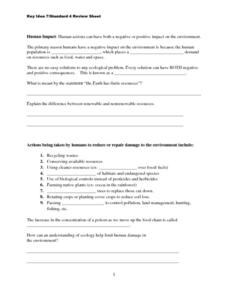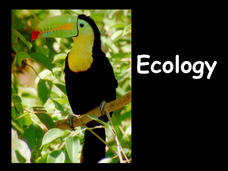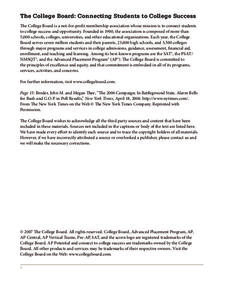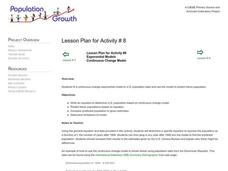Cornell University
Fibers, Dyes, and the Environment
Nanofibers can be made through electrospinning or force spinning in order to reduce the negative impact on the environment. Pupils study the role of fibers and dye on the environment through a series of five hands-on activities. Then,...
Curated OER
Changes in Ecosystems
In this changes in ecosystems worksheet, students complete 21 various types of questions related to ecosystem. First, they determine whether each statement is true or false based on vocabulary. Then, students determine whether natural...
Curated OER
Deer: Predation or Starvation
In this predation or starvation worksheet, students read about the effects of the wildlife service bringing in predators (wolves) to control a deer population. Students calculate the change in the deer population from 1971 to 1980. They...
Curated OER
Niches and Adaptations
Students present information about a species, its niche, and adaptations. In this lesson plan on animal environments, students explore how surroundings can affect a given population resulting in adaptation.
Curated OER
Progression's Price
Students reflect upon their regional and national environments, analyze causes of environmental problems as well as their implications, and examine effects of population growth as they participate in "The Popcorn Game."
Curated OER
Standard 4 Review-Human Impact
For this human impact on the environment worksheet, students fill in the blanks to complete sentences about how humans have negatively affected the environment. They complete sentences about the actions taken to reduce and repair the...
Curated OER
Bacteria and Illness
Learners research information on bacterium and their relationship to food borne diseases. In this science lesson plan, students complete internet research to construct and analyze the growth cure of common bacterium and food-borne...
Kenan Fellows
Attack of the Aphids!
Insects threaten the food production industry, and aphids are one of the big players! Analyzing data of aphid populations gives insight into their behaviors. Learners model the population data of an uninhibited population with an...
Population Connection
Meeting Human Needs
How to meet the needs of people around the globe—a question many ask. The fifth in a six-part series about human population and its effects on the globe, the eye-opening lesson includes discussion, a homework activity, and an in-class...
Statistics Education Web
Who Sends the Most Text Messages?
The way you use statistics can tell different stories about the same set of data. Here, learners use sets of data to determine which person sends the most text messages. They use random sampling to collect their data and calculate a...
Population Connection
The Human-Made Landscape
Agriculture, deforestation, and urbanization. How have human's changed the planet and how might we mitigate the effects of human activity on the planet? To answer these questions class members research the changes in human land use from...
Kenan Fellows
The Little Stuff Can Make a Big Difference
Great things come in small packages! What better way to illustrate this point than a week-long look at nanotechnology? Earth science scholars explore water quality issues through lab activities, then research new innovations in nanotech...
Biology Junction
Ecology
Psychologists study human relationships while ecologist study relationships between organisms in the environment. An introduction to ecology and the related vocabulary benefits scholars as they progress through the presentation and...
College Board
Sampling Distributions
The validity of data depends on the strength of the sample. A collection of instruction and activities focuses on sampling distributions and the analysis of that data. Scholars learn about distribution tests such and Central Limit...
Curated OER
It's (Not) Just a Bug: Simulating Invasive Insect Predation on a Plant Population
Students reflect on challenges that face farmers in cultivating crops, including insects. They then simulate how crops are affected by native and non-native insect populations and the options farmers have to protect their crops. Finally,...
Curated OER
World Population
Students examine the world population data using MyWorld GIS software and compare and contrast the population characteristics of countries around the world. Students summarize their findings in a report.
Curated OER
Population Limits
Young scholars gather information on China's government controlled population limit policy, discuss the policy with their peers, mathematically model different policies, and decide as a class on the best policy.
Curated OER
Mapping the changes in Canada's population
Learners find and analyze data found in the census. They compare the population from 1996 to 2001. They explore the type of data they can find in the Census of Population.
Curated OER
Struggle for Existence and Population Growth in Aphids
Students examine the population of aphids. They identify adaptations they have made for their environment. They make predictions, test their hypothesis and collect information that either proves or disproves their theory.
Noyce Foundation
Ducklings
The class gets their mean and median all in a row with an assessment task that uses a population of ducklings to work with data displays and measures of central tendency. Pupils create a frequency chart and calculate the mean and median....
Stanford University
The Gold Rush and San Francisco
The California Gold Rush rewrote the history of the American West, but especially that of San Francisco. After analyzing images of the city and primary sources, such as a diary entry, scholars discuss these changes. Scaffolded questions...
Alabama Wildlife Federation
Big Fish, Little Fish
Tag, you're eaten! A lesson on predator-prey relationships uses the game freeze tag as a model. Learners become either a predator or prey and play a game of tag as the prey tries to reach areas that house food and shelter. During the...
Curated OER
Exponential Models
Students fit a continuous change exponential model to U.S. population data and use the model to predict future population.
Curated OER
Maintaining Strong Fisheries
Students play a game about the life cycle of a blue crab in order to witness the causes of changes in the crab population and discuss what a resource manager could do to keep a stable crab population. Students then create a game titled...

























